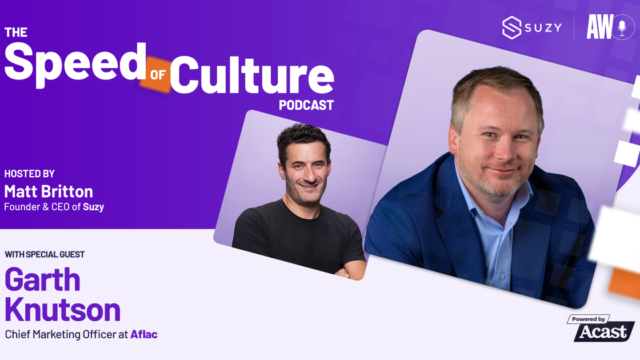Inspiration meets innovation at Brandweek, the ultimate marketing experience. Join industry luminaries, rising talent and strategic experts in Phoenix, Arizona this September 23–26 to assess challenges, develop solutions and create new pathways for growth. Register early to save.
In 2023, winning and thriving brands will stay ahead of innovation and create unique consumer experiences. But how can brands innovate and differentiate themselves in their marketing? And what can they expect in 2023 and beyond?
Raja Rajamannar, chief marketing officer at Mastercard, joins Suzy Founder and CEO Matt Britton on the latest episode of The Speed of Culture podcast in collaboration with Adweek. Rajamannar is a transformative business leader.
During his career, he managed large-scale businesses at Fortune 500 companies across financial services, consumer-packaged goods and health care at companies like Unilever, Citigroup and Anthem. Adweek has named Rajamannar one of the Top 50 Most Tech Savvy CMOs in the World and one of the Top 50 CMOs Leading Charge to Transformation. Recently, he was also named one of the World’s Most Innovative CMOs by Business Insider.
Today, Rajamannar shares his perspective on the importance of experiential marketing, how to deliver a unique consumer experience, Mastercard’s multisensory marketing strategy and the brand’s most recent financial services innovations.
Stream the new episode below, listen and subscribe on Apple Podcasts or find it on Spotify.
Learn more about Mastercard’s innovative marketing strategy by checking out the key takeaways of this episode below.
Key Takeaways:
- 08:57 – 14:26 – The importance of experiential marketing – Over the years, Mastercard has done a great job at building an attractive brand that differentiates through its products, messaging and communication. However, in an increasingly digital world, advertisements continue to clutter our lives, and consumer attention is difficult to grasp. So Mastercard decided to shift towards experiential marketing, enhancing the brand’s possibilities to curate and create delightful and fulfilling consumer experiences.
- 14:26 – 15:40 – Delivering a delightful consumer experience – Experiential marketing focuses on delivering personalized customer experiences. Mastercard conducted global research and came up with 10 passion points they can leverage, like sports, music, travel, philanthropy and the environment. In each one of these passion points, the company curates consumer experiences at scale.
- 15:42 – 18:25 – Multisensory marketing – When it comes to senses, marketers typically focus only on sight and sound. Mastercard wants to deliver a full sensory experience involving taste, touch and smell. For example, the brand delivers culinary experiences by organizing priceless tables you can find in unexpected places with an extraordinary eating experience and food served by Michelin-star chefs. Mastercard also started managing its own restaurants.
- 18:26 – 21:01 – Mastercard sonic brand identity – Mastercard conducted detailed research to understand the effect of sound on the brain. Each sound impacts people’s feelings and emotions differently. So the brand came up with its own sonic branding identity—how Mastercard presents itself as a sound. Rajamannar and his team worked with musicians, neurologists, musicologists and other industry professionals to develop a multilayer architecture of Mastercard’s sonic brand.
- 21:01 – 24:55 – Staying innovative in financial services – Rajamannar believes companies that stay ahead of innovation are the ones that will win in their industry, which is what Mastercard tries to do in the financial services space. For example, the company adopts financial services like crypto and NFTs, but it also goes beyond payments with the Mastercard health care business.









